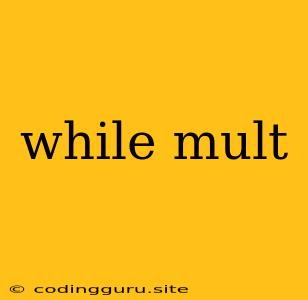Understanding the Power of the "while" Loop and Multiplication: A Beginner's Guide
The "while" loop and multiplication are fundamental concepts in programming. Whether you're working with JavaScript, Python, or any other language, understanding these concepts is crucial for building efficient and effective code. Let's dive into what "while" loops are, how they work with multiplication, and why they are so important.
What is a "while" Loop?
A "while" loop is a powerful control flow statement that allows you to repeat a block of code as long as a certain condition remains true. Think of it as a loop that keeps running and running until something stops it. This "something" is the condition you define.
Example:
let count = 0;
while (count < 5) {
console.log("Count is:", count);
count++;
}
In this example, the code inside the curly braces will keep executing as long as the variable "count" is less than 5. The loop will print the current value of "count" and then increment it by 1 until it reaches 5, at which point the loop will stop.
How "while" Loops Work with Multiplication
Now, let's combine "while" loops with multiplication. We can use "while" loops to perform repeated multiplication, which is very useful for tasks like calculating powers, calculating factorials, or generating sequences of numbers.
Example: Calculating Powers
let base = 2;
let exponent = 3;
let result = 1;
while (exponent > 0) {
result *= base;
exponent--;
}
console.log(base, "to the power of", exponent, "is:", result);
In this example, the loop keeps multiplying "result" by "base" as long as "exponent" is greater than 0. After each multiplication, the "exponent" is decremented. This effectively calculates the base raised to the power of the exponent.
Tips for Using "while" Loops with Multiplication:
- Clear Condition: Make sure the condition for your "while" loop is well-defined. The condition should eventually become false to prevent an infinite loop.
- Increment/Decrement: Use an increment or decrement operation to change the condition within the loop. This will eventually make the condition false and end the loop.
- Initial Value: Initialize any variables that are used in the loop, particularly those involved in the condition, before starting the loop.
Why are "while" Loops Important?
"while" loops are essential because they provide a way to automate repetitive tasks. This makes your code more concise, efficient, and manageable. Here are some examples of where they shine:
- Iterating through data: "while" loops can process data in a list, array, or file one item at a time.
- Generating sequences: They can be used to create sequences of numbers, strings, or other data structures.
- Handling user input: They can repeatedly prompt a user for input until a specific condition is met.
Conclusion
The "while" loop is a fundamental programming construct that empowers you to repeat code based on a given condition. By combining "while" loops with multiplication, you can efficiently perform repeated calculations, making your code more powerful and elegant. Understanding "while" loops is crucial for any aspiring programmer, as they offer a versatile tool for automating repetitive processes and achieving complex results in your code.
